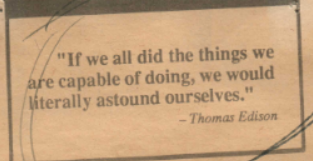
What’s On Your “Stop Doing” List?
June 16, 2022
Legacy gift from my father: his favorite quotes
August 15, 2022
What does it take to have a life free from financial stress and worry?
If your answer was money—nope. There is no immunity conferred from dollars that protects us from fear of loss, worries about scarcity, or anxiety over the What If?
For some clients unraveling their Money Story is an important piece of what it takes. We start to write our Money Story before we get to kindergarten. It influences how we act when we have money or don’t, the expectations we have about it and our financial decisions. The narrative we carry grows out of our beliefs about money, and from what we experienced in our families when we were little as well as peers, neighbors, church and the media.
If what you heard about money when you were growing up and how you saw money was earned, spent and saved imbued you with the idea that your effort could reasonably translate to reward, or other forms of empowerment around money, you’ve probably gone on to have what’s called a “growth mindset” around money. That is, you feel pretty good about your relationship with money, and what you say matters to you—your values—can be seen walking and talking in the choices you make with your dollars.
It’s a spectrum, to be sure, not some have this growth mindset and others don’t. But for many people their Money Story is more complicated. Maybe they saw a wealthy and powerful person in their community who was dishonest, or watched their parents never get ahead no matter how hard they worked. What results is often a sense of hopelessness.
Brené Brown in her book Atlas of the Heart says, “Hopelessness arises out of a combination of negative life events and negative thought patterns, particularly self-blame and the perceived inability to change our circumstances.” It’s not a step too far for many of us to see how that shows up in our financial behavior, expectations and decisions.
Ms. Brown’s research suggests that there are three obstacles to overcoming hopelessness. I was so excited to hear her lay it out this way because this is the Financial Planning Trifecta.
Goals
“Hopelessness stems from not being able to set realistic goals. We don’t know what we want.”
Pathways
“Even if we can identify realistic goals, we can’t figure out how to achieve them. If we attempt to achieve the goals, we give up and we fail; we can’t tolerate disappointment and we can’t reset.”
Agency
“We don’t believe in ourselves or our ability to achieve what we want.”
Financial planning done right helps people overcome these obstacles. With the guidance of a knowledgeable thinking partner, we can figure out what we want. Looking at investment options, tax implications, where to save, how much house to buy . . . these are all important steps to achieve goals, and a financial planner helps figure it out and then stay accountable to those steps rather than stress over the things we can’t control. Progress helps to rewrite the Money Story to one of power and possibility. That’s how to get on the path to a life free from financial stress and worry.
